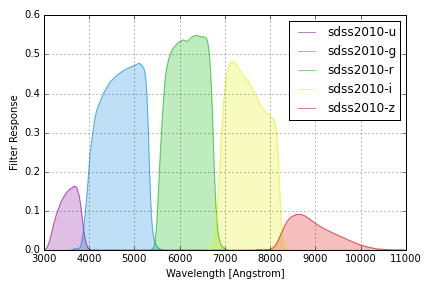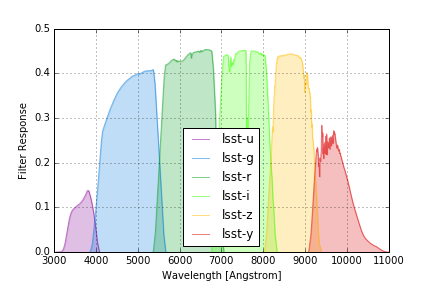I read somewhere that the LSST has six filters. Presumably these are u, g, r, i, z and Y.
Do these bands exactly match the SDSS bands in terms of central wavelength and bandwidth?
Regards: Paul
I read somewhere that the LSST has six filters. Presumably these are u, g, r, i, z and Y.
Do these bands exactly match the SDSS bands in terms of central wavelength and bandwidth?
Regards: Paul
Does https://github.com/lsst/throughputs help? (I believe the technically correct answer is “they do not exactly match”.)
Not even close. The LSST chips aren’t as hot in the blue (where we used special NR coating in the u band, both on the chips and the dewar window). In the red, SDSS z was cut off by the Si absorption of a thin CCD, so the LSST z is much bluer, narrower, and more sensitive. Then LSST puts a y band to the blue of z.
Look at the filter curves
For a detailed quantitative comparison, and code and data to overplot
different versions of filter sets on top of each other, please see
http://speclite.readthedocs.io/en/latest/filters.html
Hi @yorkpf, thank you for your question.
You are correct that the LSST has six filters, ugrizy. These bands do not exactly match the SDSS bands. For a quick comparison, see the relevant plots below, which are from http://speclite.readthedocs.io/en/latest/filters.html.


If you’re looking for more information or would like access to the transmission curves themselves, the best place to start is the left-hand menu bar of the “for scientists” page at https://www.lsst.org/scientists. There you will find a link to Filter Throughputs which takes you to a GitHub repository of filter transmission curves (https://github.com/lsst/throughputs). As the readme file describes, the LSST throughput curves are in the “baseline” directory, and those are the ones you should use to, e.g., calculate expected magnitudes. For a more detailed comparison of various filter systems with the LSST filters, and/or code to use to make plots like the ones shown above, visit http://speclite.readthedocs.io/en/latest/filters.html.
Thanks again for posting your question, and if you have any further questions on this topic please don’t hesitate to reply to this thread.
Thanks Melissa - that was most helpful. I can take it from here.
Paul